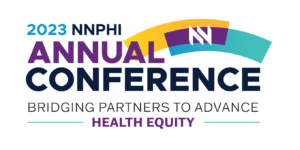
Health Resources in Action (HRiA) looks forward to participating in the National Network of Public Health Institutes (NNPHI)’s annual meeting in Washington, D.C. on May 9-11, 2023! This year, we’re sending ~25 staff members to learn, connect, and share lessons learned from our work over the past year. Below, you’ll find a list of our team members attending the conference, information on our posters and presentations, and curated content and resources to learn a bit more about us. We hope to see you there!
Posters
Addressing the Wellness Needs of the Community Violence Interventionist Workforce
Natalie Johnson, LJ Wallace, Mo Barbosa, Anna Thordarson
Community violence interventionists (Streetworkers) are a crucial element in preventing gun
violence in cities around the country. As such, Streetworkers’ wellness and mental health should
be better addressed on the organizational, community, and individual levels. In 2019, with
funding from the Massachusetts DPH, we launched the Gun Violence Prevention Training
Center for Excellence (TC4E), which delivers training, technical assistance, and
network-building to young adult-serving GVP organizations across the state. This session will
present an in-depth look at the state of the Streetworker field today and will explore the ways
that the TC4E has tackled the issues of mental health, feelings of isolation, and harmful
organizational policies that burden Streetworkers. We will also share recommendations for other organizations to build the capacity and increase the well-being of their Streetworker team.
Centering BIPOC communities in determining distribution of funds and design of substance use program in MA
Tamaki West, Bethel Woappi, Andrea Macone (MA Dept. of Public Health)
Black, Indigenous and People of Color (BIPOC) are disproportionately affected by substance use disorder, yet their voices are often not reflected in the solutions. BIPOC communities should be more than recipients of programs – they should also be at the table deciding who and what is funded. The MA Department of Public Health’s Bureau of Substance Addiction Services partnered with Health Resources in Action, a Boston-based public health institute, to launch an initiative that puts BIPOC voices at the center of decision making of what and who is funded. This initiative launched the first ever bureau-wide advisory committee to help identify statewide funding gaps and a Community Advisory Board (CAB) that is comprised of primarily BIPOC residents and organizations with lived experience to help design and implement a grantmaking program. Learnings from this initiative will be shared, particularly, the community engagement model central to its approach that can be applied to local contexts.
Presentations & Round Tables
Seizing the opportunity for equitable recovery through the American Rescue Plan Act (ARPA)
Ben Wood, Mo Barbosa, Erika Gaitan, Cynthia Espinosa Marrero
Tuesday May 9th, 3:00 – 3:30 PM
The American Rescue Plan Act (ARPA) represents an imperative for local governments to intentionally engage with and invest in communities who, because of deliberate governmental and institutional policy decisions, are regularly harmed by and disenfranchised from government budgeting processes. ARPA funds can be truly transformational, both as a process to build community power, and because of investments that address community defined priorities and the social conditions that lead to opportunity or disadvantage. But cities need help to make this a reality. In this workshop and based on our experiences in Massachusetts, we will describe, discuss, and collectively identify solutions for public health institutes to: advocate for public health investments to promote equitable recovery; increase power for disenfranchised populations to decide how public resources get spent; and normalize actions that demonstrate how government can collaborate with those closest to the issues.
Best Practice Dissemination through the National COVID-19 Health Equity Technical Assistance Project
Ben Wood, Vanessa Fry, Jannah Bierens, Lindsay Rosenfeld
Wednesday, May 10th, 11:00 AM – 12:30 PM
The OT21-2103 funding opportunity in response to COVID-19 health disparities by race/ethnicity and rural geography, represents CDC’s largest investment to date focused specifically on reducing health inequities related to COVID-19. The National Network of Public Health Institutes (NNPHI) is one of three national partners providing technical assistance for grantees, with a specific focus on elevating best and promising practices. NNPHI has created a collaborative of public health institutes and other technical assistance providers available for capacity-building technical assistance for grant recipients that includes partnership development, evaluation of best practices, as well as the identification, adaptation and tailoring of equity-focused best practices. Outputs of this work include a community engagement training and toolkit, an equity-centered data webinar series, as well as a Project ECHO series to support grant recipients in achieving their objectives.
Advancing Community Engagement and Health Equity for State and Local Health Departments
Kate Holmes, Brittany Chen, Laurie Jo Wallace
Wednesday, May 10th, 11:00 AM – 12:30 PM
In this workshop, we will define core concepts related to health equity, mental models, and power mapping and apply these learnings to participants’ community engagement strategies and approaches to explore a key question: how can we broaden our mental models to integrate approaches that more intentionally include more community voice and builds community power?
This session will inspire and support reflection, improve public health practice, and provide practical tools in pursuit of authentic community engagement using a new community engagement toolkit developed through a cross-public health institute partnership that includes Health Resources in Action, Michigan Public Health Institute, Montana Public Health Institute, and Public Health Institute’s Center for Wellness and Nutrition.
PHI’s role in addressing the health and other impacts of anti-trans legislation
May 11, 2023, 8:30 AM-9:30 AM
Facilitated discussion to explore how public health institutes can be better situated to advocate for trans rights, support our partners, and create more welcoming environments in our institutions.
Content and Resources
Recent blog posts
From Toolkits to Test Strips: Exploring the HRiA Clearinghouse (2023)
 Established in 1997, the Clearinghouse has expanded to include over 1,200 products in 29 languages, distributing millions of units of public safety and health materials annually on behalf of several state agencies. Learn how the HRiA Clearinghouse is leveraging legacy and innovation to serve partners and communities in Massachusetts and beyond.
Established in 1997, the Clearinghouse has expanded to include over 1,200 products in 29 languages, distributing millions of units of public safety and health materials annually on behalf of several state agencies. Learn how the HRiA Clearinghouse is leveraging legacy and innovation to serve partners and communities in Massachusetts and beyond.
Beyond COVID: Four Communities on Connecting, Healing, and Building Toward the Future (2023)

In May 2023, COVID-19’s federal emergency status will be lifted, yet the recovery from its impacts is far from over. To mark this important milestone, we asked four community-serving organizations in Massachusetts to reflect on the effects of the pandemic on their communities, the strategies they used to care for each other, and their vision for a future beyond COVID.
The Health Tree Metaphor and the Importance of Shared Language (2023)
 The Massachusetts Community Health and Healthy Aging Funds (aka The Funds), a collaboration with the Massachusetts Department of Public Health, aims to dismantle systemic and structural racism in communities throughout the Commonwealth. In this piece, readers will learn about the power of creating shared language and how the Funds team developed a tool to help others to do this essential work.
The Massachusetts Community Health and Healthy Aging Funds (aka The Funds), a collaboration with the Massachusetts Department of Public Health, aims to dismantle systemic and structural racism in communities throughout the Commonwealth. In this piece, readers will learn about the power of creating shared language and how the Funds team developed a tool to help others to do this essential work.
The ARPA-tunity of a lifetime (2022)
COVID-19 laid bare inequities across the Commonwealth and the country, and ARPA funds are designed to address them. To do this effectively, local government must engage with community groups and residents that have been disproportionately impacted by the pandemic to set priorities and make community-driven investments. HRiA is collaborating with communities to support engagement strategies and lift up local examples to learn from and inspire creative, transformative approaches across Massachusetts.
Our Team



























